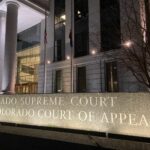What is one hotel worth? State Supreme Court wades into dispute over luxury Vail hotel

Vail Resorts and Eagle County hold different views about how much a luxury hotel property in the core of Vail Village is worth – specifically, a difference of $24 million.
Now, the Colorado Supreme Court has agreed to decide whether the Fortune 500 company and the state of Colorado are correct that the disputed property should be assessed at a lower amount for taxation, or if Eagle County and the state’s second-highest court used a valid calculation to reach a much higher value.
The justices heard oral arguments last week about the implications of a peculiar physical and financial arrangement between The Lodge at Vail and its neighboring properties. Both sides accuse the other of advocating for a rule that, they say, would enable property owners to game the system in order to slash their tax bills.
Vail Resorts, argued the county’s lawyer, Richard F. Rodriguez, is asking the court to “judicially sanction a method whereby a property owner can funnel revenues to avoid tax liability, creating a system where some property owners in Colorado are taxed and assessed based merely on their corporate structure, as opposed to the value of their real property.”
The case revolves around The Lodge, a 160-room site whose owner, Lodge Properties, Inc., is a subsidiary of Vail Resorts. Only 80 of the rooms are actually part of the hotel itself. The remaining units are privately-owned condominiums that are physically connected to The Lodge.
What makes the arrangement complicated is the fact that The Lodge regularly uses many of the condo units as hotel rooms, with guests unaware of who actually owns the unit. Other Vail subsidiaries, RockResorts International and Vail/Beaver Creek Resort Properties, provide rental management services for the majority of condo units, renting them to guests and retaining 40% of the proceeds. The Lodge’s employees also service the condos, and guests have the right to use The Lodge’s amenities, including exercise facilities and spa.
In 2017, the Eagle County assessor valued The Lodge’s taxable real property at $41.1 million by including, controversially, the income Vail’s subsidiaries received from the condo rentals.
Lodge Properties balked and appealed to the Eagle County Board of Equalization. Its counteroffer was that The Lodge had an actual value of $20.5 million.
At a hearing before the board, a certified appraiser with the county explained the theory for including the rental income in the valuation: If The Lodge were put up for sale, a buyer would not only pay for the hotel itself, but would want to secure the lucrative condo agreement. That agreement is only possible through the physical integration of the condos with the hotel.
The Board of Equalization subsequently set the value of The Lodge at $44.3 million.
Lodge Properties turned to the state Board of Assessment Appeals, which sided with the company and ordered the exclusion of the condo income from the property valuation. Yet another reversal occurred in September 2020, when a three-member panel of the Court of Appeals agreed that Eagle County had it correct all along.
The court rejected Lodge Properties’ argument that the rental income is “intangible” and, therefore, excludable. It also agreed that the condo rental contracts through Vail Resorts’ subsidiary Vail/Beaver Creek would likely transfer to a hypothetical purchaser of The Lodge at Vail, and were part of the hotel’s market value.
“[W]e are hard-pressed to believe that a purchaser of LAV would agree to the sale without also securing the rental contracts that would allow it to collect over $3.6 million in rental revenue,” wrote Judge Neeti Vasant Pawar. “Condo net income therefore provides an income stream to VBC, and ultimately to Vail Resorts, that can transfer with a sale of the LAV property.”
With the case now before the Supreme Court, Lodge Properties is calling the Court of Appeals’ decision unprecedented. From its point of view, the income it receives on the condos is merely part of a rental services agreement with the condo owners. Furthermore, it argued, property tax valuations should depend solely upon the property in question, not other owners’ property.
“No Colorado case has ever allowed a property tax assessment to capture income generated by separate, off-site property, or has even suggested that offsite income could properly be captured in an assessment,” the company’s lawyers wrote to the court.
Eagle County, on the other hand, viewed as crucial the access that condo guests have to The Lodge’s amenities. If not for the complete integration of the condos with the hotel property, the county suggested, there would be no reason for the agreement with Vail Resorts’ subsidiary.
“It defies logic to presume that 100% of the gross revenues received by Vail Resorts from guests renting condos is derived solely from the individual condo units, and not at all from the location and Amenities associated with the Lodge,” the county’s lawyers wrote.
During oral arguments last week, the justices attempted to comprehend the significance of counting the condo rental revenue in The Lodge’s property valuation.
“Where’s tax getting missed here? It’s the condo owners who own it. They rent and they pay tax on what they rent,” said Justice Richard L. Gabriel. “I tend to agree that’s gonna get factored into the market value of the condo. The face of this contract is a services contract.”
“I’m worried about the slippery slope,” added Justice Carlos A. Samour Jr. “I do see a difference between the management services agreement here and a lease. So what’s next? How far do we go? What else is gonna be included now as property tax?”
Justice Melissa Hart asked whether the court, in order to side with Eagle County, needed to “accept the underlying premise that you’ve articulated that there is something about the arrangement between VBC and The Lodge that was set up for tax evasion purposes?”
Rodriguez, the attorney representing the Eagle County Board of Equalization, responded, “We’re not suggesting that anybody did anything to evade paying taxes here.”
That statement, however, ran contrary to the accusations in Eagle County’s written brief to the court.
“The Court should see through Vail Resorts’ corporate scheme to avoid taxation,” the county’s lawyers previously wrote.
Rodriguez provided examples of how a ruling in Lodge Properties’ favor could cause property owners to creatively divide parcels or contract for property management services to avoid accounting for the income generated by their property.
Lodge Properties, however, claimed it was the county’s position that would lead to tax evasion through the ability to point to nearby amenities as the source of value.
“A taxpayer need only argue,” the company wrote to the court, that it “‘defies logic’ to presume that her property generates all its rental income on its own – surely nearby Coors Field or redeveloped Union Station should really get the credit – so her tax liability should be reallocated to other parcels.”
The Attorney General’s Office, representing the Board of Assessment Appeals, similarly argued the rental management agreement for the condo units was not a basis for assigning extra value to The Lodge.
The case is Lodge Properties et al. v. Eagle County Board of Equalization.












